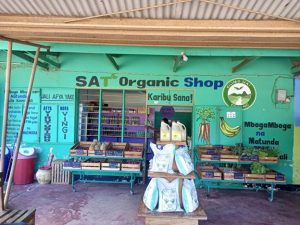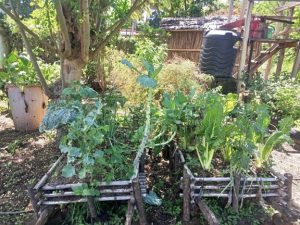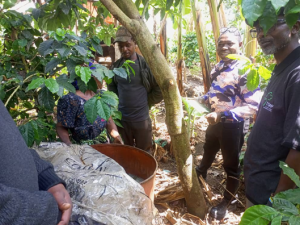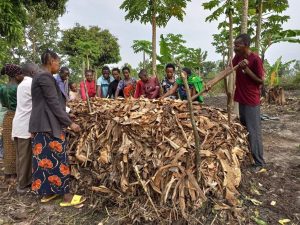Exploring the heart of agroecology transition in Tanzania: A First-hand account from the AFSA’s HSHF officer.

Morogoro, Tanzania – November 2023 – The journey into the heart of Tanzania’s agroecological movement, led by Sustainable Agriculture Tanzania (SAT) uncovers a thriving landscape of sustainable practices and innovative farming techniques. SAT is one of the 15 Healthy Soil Healthy Food (HSHF) Centres supported by the Alliance for Food Sovereignty in Africa (AFSA).
My expedition commenced with an arrival in Morogoro, following a five-hour drive from Dar es Salaam. The destination was the SAT Centre, a revelation for agroecological practices, situated in Tushikamane Centre, Kilakala Road. SAT’s approach, rooted in four pillars – knowledge dissemination, application and marketing, research driven by farmer demand, and networking – aims to enhance the uptake of agroecological practices in Tanzania. The SAT centre, adorned with demo gardens showcasing diverse crops and gardening techniques, serves as an inspiration for sustainable agriculture.

This is the SAT Vegetable demo garden at the main office in Morogoro where agroecological practices are demonstrated.
My journey continued to Vianzi, where the SAT Farmer Training Centre (FTC) stands as evidence of agroecology transition, in a journey to transform degraded land into a lush, green sanctuary. The FTC, established in 2013, overcomes challenges like droughts and poor soil conditions, boasting facilities like workshops, comprehensive water systems, solar power, and biodiverse gardens.
At the FTC, integrated pest management, biodiversity in crops, and a focus on therapeutic plants like Artemisia annua against diseases like malaria and COVID-19, highlight SAT’s commitment to creating and sustaining a healthy agroecosystem and the people. The presence of farm animals, greenhouses, and innovative irrigation systems powered by solar energy further exemplifies this commitment. Demonstrations of urban agricultural practices at the FTC, including hanging gardens and soil boxes, showcase adaptable farming techniques for urban settings. The on-site milk processing unit, though operating below potential, links the dairy value chain from production to sales at the SAT organic shop in Morogoro.
The visit was followed by a trip to Mbeya to gather first-hand experiences from farmers and their trainers. Encounters with agroecology farmer trainers like Isaiah Haule at the Nanenane Farmers Exhibition Centre and visits to Vicent Donald Luwonge and Ruth Andulire Mwasikili illustrated their enthusiasm for agroecological practices. Suma Phillip’s story in Mwandanje Village, where she grows diverse crops, raises poultry, and shares her knowledge in agroecology, encapsulates the level of empowerment the agroecology farmer trainers have imparted to the farmers.

These are the farmers I visited who have adopted agroecological practices.
I also learnt that this year (2023), SAT has trained 10 agroecology farmer trainers (including Isaya Haule whom I visited), focusing on organic farming and soil fertility, followed by these trainers extending their knowledge to 171 farmers in various districts (including Suma Phillip, Vicent Donald Luwonge and Ruth Andulire Mwasikili whom I visited). Further, follow-up visits made by SAT facilitators revealed a high adoption rate (70.76%) of agroecological practices among farmers, such as composting and intercropping. Furthermore, SAT supported 20 farmers to participate in the third National Ecological Organic Agriculture Conference, enhancing their voices for agroecology. SAT is calling for more local extension agent involvement in the training activities to re-orient them to agroecology ideology and win their support for a smooth farmer outreach. SAT played a critical role by providing facilitators, financial support, and establishing connections with government agencies, ensuring the project’s success and sustainability.

These are farmers during a training by agroecology farmer trainers mentored by SAT.
My visit to Tanzania underscores the resilience, innovation, and growth within the realm of agroecology in Africa. It highlights the transformative potential of agroecology practices in enhancing food sovereignty and environmental stewardship.
































